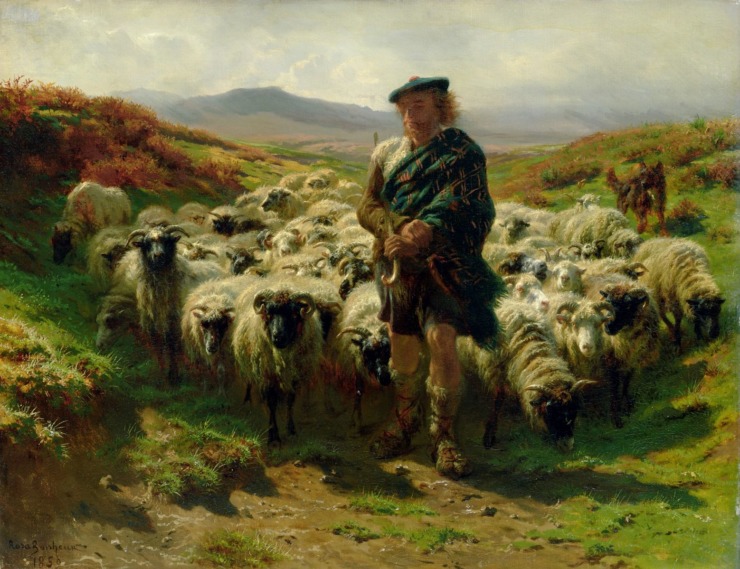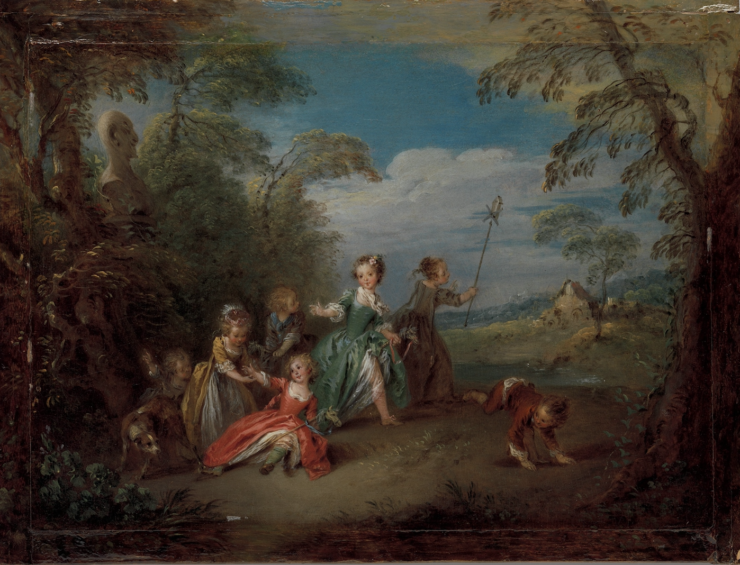The Song of the Happy Shepherd
The woods of Arcady are dead,
And over is their antique joy;
Of old the world on dreaming fed;
Gray Truth is now her painted toy;
Yet still she turns her restless head:
But O, sick children of the world,
Of all the many changing things
In dreary dancing past us whirled,
To the cracked tune that Chronos sings,
Words alone are certain good.
Where are now the warring kings,
Word be-mockers?—By the Rood
Where are now the warring kings?
An idle word is now their glory,
By the stammering schoolboy said,
Reading some entangled story:
The kings of the old time are fled
The wandering earth herself may be
Only a sudden flaming word,
In clanging space a moment heard,
Troubling the endless reverie.
Then nowise worship dusty deeds,
Nor seek; for this is also sooth;
To hunger fiercely after truth,
Lest all thy toiling only breeds
New dreams, new dreams; there is no truth
Saving in thine own heart. Seek, then,
No learning from the starry men,
Who follow with the optic glass
The whirling ways of stars that pass—
Seek, then, for this is also sooth,
No word of theirs—the cold star-bane
Has cloven and rent their hearts in twain,
And dead is all their human truth.
Go gather by the humming-sea
Some twisted, echo-harbouring shell,
And to its lips thy story tell,
And they thy comforters will be,
Rewarding in melodious guile,
Thy fretful words a little while,
Till they shall singing fade in ruth,
And die a pearly brotherhood;
For words alone are certain good:
Sing, then, for this is also sooth.
I must be gone: there is a grave
Where daffodil and lily wave,
And I would please the hapless faun,
Buried under the sleepy ground,
With mirthful songs before the dawn.
His shouting days with mirth were crowned;
And still I dream he treads the lawn,
Walking ghostly in the dew,
Pierced by my glad singing through,
My songs of old earth’s dreamy youth:
But ah! she dreams not now; dream thou!
For fair are poppies on the brow:
Dream, dream, for this is also sooth.
-WB Yeats
Enjoy Artistic Representations of “The Song of the Happy Shepherd” by WB Yeats

The Highland Shepherd by Rosa Bonheur, 1859.

The Golden Age by Jean-Baptiste Pater, 1715-1736.
Listen to this Reading of “The Song of the Happy Shepherd”
Listen to this Musical Interpretation of “The Song of the Happy Shepherd” by WB Yeats
About W.B. Yeats
William Butler Yeats was born in 1865 in Dublin into a family of the Protestant Anglo-Irish landowning class. He lived in Dublin and London during his growing up years. He was very much affected by the politics of the time, as he was a young adult when the protestant minority in power began to be displaced by the predominantly Catholic nationalist movement.
Yeats studied law for a time but eventually moved to London to study art. He was an accomplished playwright, and a founder of the Irish Theatre which was later to become the Abbey Theatre. While he is better known for his poetry, Yeats was awarded the Nobel Prize for Literature in 1923 more for his theatrical works than his verse. He was the first Irishman to be awarded the prize.
His first collection of poems was published in 1889, and there is strong evidence of the influence of Edmund Spenser and Percy Bysshe Shelley. Later, his poetry became more rooted in realism and the physical, with influence of Ezra Pound and William Blake apparent. Common themes in his poetry include mysticism, spiritualism, the occult and Irish identity and nationalism.
Yeats was appointed to the Irish senate in 1922. He was married, but had an ongoing relationship of sorts with a former love, Irish activist and revolutionary Maud Gonne. Known as one of the greatest poets of the 20th century, Yeats died in 1939.
That’s it for The Song of the Happy Shepherd!
BUY ‘HOW TO WRITE A FORM POEM’ NOW!
